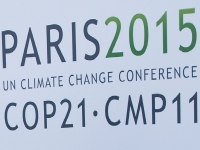Health
CONVENTION ON CLIMATE CHANGE - FRANCE WILL BE HOSTING & PRESIDING 21ST SESSION
FROM NOVEMBER 30 TO DECEMBER 11, 2015

(Source: Cop21)
In 2015, France will be hosting and presiding the 21st Session of the Conference of the Parties to the United Nations Framework Convention on Climate Change (COP21/CMP11), otherwise known as “Paris 2015“.
This Framework Convention is a universal convention of principle, acknowledging the existence of anthropogenic (human-induced) climate change & giving industrialized countries the major part of responsibility for combating it.
The United Nations Framework Convention on Climate Change, or “UNFCCC“, was adopted during the Rio de Janeiro Earth Summit in 1992. It entered into force on 21 March 1994 and has been ratified by 196 States, which constitute the “Parties“ to the Convention ““ its stakeholders.
This Framework Convention is a universal convention of principle, acknowledging the existence of anthropogenic (human-induced) climate change & giving industrialized countries the major part of responsibility for combating it.
The United Nations Framework Convention on Climate Change, or “UNFCCC“, was adopted during the Rio de Janeiro Earth Summit in 1992. It entered into force on 21 March 1994 and has been ratified by 196 States, which constitute the “Parties“ to the Convention ““ its stakeholders.
It is the largest diplomatic event ever hosted by France and one of the largest climate conferences ever organized, bringing together around 40,000 participants in total (delegates representing each country, observers, and civil society members).
The will to act together and to keep within the +2°C limit led to the creation of the Durban Platform (ADP) , with the role of bringing together all developed and developing countries to work on a "protocol, legal instrument or agreed outcome with legal force“, applicable to all parties to the UN Framework Agreement on Climate Change.
The will to act together and to keep within the +2°C limit led to the creation of the Durban Platform (ADP) , with the role of bringing together all developed and developing countries to work on a "protocol, legal instrument or agreed outcome with legal force“, applicable to all parties to the UN Framework Agreement on Climate Change.
The “new instrument“ will have to be adopted in 2015 and implemented from 2020, and that is the goal of the 2015 Paris Conference. The Doha Conference enshrined the commitment of several industrialized countries in a second period of commitment to the Kyoto Protocol (2013-2020) and concluded the Bali Mandate.
Who represent the Civil society also called "observes" :
- Business and Industry NGOs (BINGO);
- Environmental NGOs (ENGO);
- Local Government and Municipal Authorities (LGMA);
- Indigenous Peoples Organizations (IPO);
- Research and Independent NGOs (RINGO);
- Trade Union NGOs (TUNGO);
- Women and Gender organizations;
- Youth NGOs (YOUNGO);
- Farmers.
Source : Cop21
Who represent the Civil society also called "observes" :
- Business and Industry NGOs (BINGO);
- Environmental NGOs (ENGO);
- Local Government and Municipal Authorities (LGMA);
- Indigenous Peoples Organizations (IPO);
- Research and Independent NGOs (RINGO);
- Trade Union NGOs (TUNGO);
- Women and Gender organizations;
- Youth NGOs (YOUNGO);
- Farmers.
Source : Cop21
Ruby Bird Yasmina Beddou Cop21 Le Bourget United Nations Exhibition Conference Univerqal Climate Agreement Framework Convention Change Crucial International Countries Global Warming France Leaders European Union
Liability for this article lies with the author, who also holds the copyright. Editorial content from USPA may be quoted on other websites as long as the quote comprises no more than 5% of the entire text, is marked as such and the source is named (via hyperlink).






